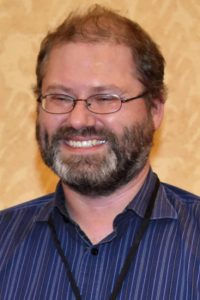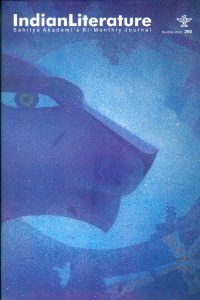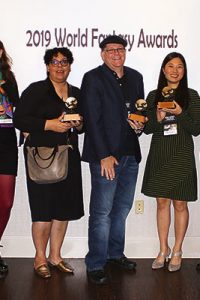K.W. Jeter: Rockin’ in the Steampunk World

Kevin Wayne Jeter was born March 26, 1950 in Los Angeles. He attended California State University of Fullerton with classmates Tim Powers and James P. Blaylock, where he also met his wife Geri, and graduated with a degree in sociology. During the ’70s he became friends with his literary hero, Philip K. Dick. Since then he has led ‘‘the ramshackle writer life,’’ residing up and down the West Coast until moving to Ecuador a few years ago.
His first published novel was Seeklight (1976), followed by Dreamfields (1976), Morlock Night (1979), and Soul Eater (1983). The first novel he actually wrote, Dr. Adder, appeared in 1984, followed by sequels The Glass Hammer (1984), Dr. Adder in Death’s Arms (1987), and Alligator Alley (1989, co-written with Ferret). With Infernal Devices (1987) Jeter became a pioneer of the steampunk subgenre – a term Jeter coined in a letter to this very magazine that same year. Farewell Horizontal (1989), Madlands (1991), and Noir (1998) are SF thrillers, but he turned increasingly to horror with titles like Mantis (1987), Dark Seeker (1987), In the Land of the Dead (1989), The Night Man (1990), and Wolf Flow (1992). He wrote four-volume comic Mister E (1991), and wrote many novelizations in the ’90s, including Star Wars and Star Trek volumes, plus three novel sequels to the film Bladerunner, based on Dick’s Do Androids Dream of Electric Sheep?
After a hiatus of some years, Jeter has recently returned to the field with Fiendish Schemes (2013) from Tor, a sequel to Infernal Devices. He began self-publishing the Kim Oh thriller series with Real Dangerous Girl (2013), with four volumes out so far.
Excerpts from the interview:
 ‘‘Fiendish Schemes is the long-delayed (as they tell me) sequel to Infernal Devices, so I’m picking up the steampunk thread that so many others have done fabulous things with. I jumped back into that pool and am having a fine old time.
‘‘Fiendish Schemes is the long-delayed (as they tell me) sequel to Infernal Devices, so I’m picking up the steampunk thread that so many others have done fabulous things with. I jumped back into that pool and am having a fine old time.
‘‘When I wrote Morlock Night I hadn’t traveled to England. Before I wrote Infernal Devices, I managed to get to London and I could see all the things I got wrong, of course, but gratifyingly there were at least a few things I got right. In terms of influence, I’ve always been a stodgy old person (even when I was young) and so I read a lot of Victorian literature. Not just the obvious stuff, Dickens and that sort of thing, but the more obscure people, like George Gissing. He was a literary writer, a friend of H. G. Wells. He’s just about the grimmest writer you could ever imagine. There are a bunch of his books I’m glad I read, but would never read again because they’re so depressing. There were also great Victorian thriller writers like Harrison Ainsworth, probably best known for his novel Rookwood. He was the Stephen King of his day in terms of writing pulse-pounding thrillers. I always recommend people read Harrison Ainsworth. I’m also a one-man anti-defamation league for Lord Bulwer-Lytton. A lot of people make fun of Bulwer-Lytton, but he was actually a good writer, except for his poetry, which is dreadful. His novels are quite good. I think he’s unfairly ridiculed, so I’m constantly recommending him. Of course, people just assume that means I’m as crazy as he was.”
…
‘‘The characters in Infernal Devices use a machine that gives them fragmentary glimpses of what will happen in the future; that’s something I return to in Fiendish Schemes, only now I have a lot more hindsight about what the future turned out to be, from the perspective of the Victorians. Infernal Devices was designed to be a lighthearted comedy, with a sad-sack central character who gets swept up in events. Fiendish Schemes turned out a little deeper and darker because of that additional hindsight I have now about what the future became. What I didn’t have a clear picture of when I wrote Infernal Devices so many years ago, but other writers have picked up on since, was the ability to use this crazy anarchic ahistorical approach that steampunk has become, and do some really interesting things with it. In a lot of ways, I’m influenced by the younger steampunk writers who came along after me and by what they’ve accomplished, taking this crazy notion and doing anarchic things with it. That’s been exciting.”
…
‘‘Being down in Ecuador, traveling is a little more involved for us. We were either going to go to Worldcon in San Antonio or to Brighton for World Fantasy Con. We decided, because we wanted to see all of our British friends, that we’d come to World Fantasy. Then I read a lot of people’s blog posts and things, friends of mine, when they came home from San Antonio. Of course they had a great time, but people were saying, ‘Gosh, it seems like everybody was so old.’ I said, ‘Go to a steampunk convention, because that skews way younger.’ A lot of the wildness makes some dismiss it as just people running around with goggles on their top hats and corsets on the outside of their dresses. But it’s also this anarchic approach to history. In steampunk, historical accuracy doesn’t matter. There’s a bunch of stuff happening in South America too, in Bogota, and in Brazil it’s huge.”
…
‘‘I’m making an effort not to shackle myself to steampunk. I’ve got a bunch of stuff sitting out with my agent and my editors now, which will be a continuation of the noir crime thriller orientation I had in books like Madlands, Farewell Horizontal, and some of my horror novels. I’m trying to keep the bifurcation going with the steampunk projects here and the crazy noir there. I’ve got a thriller series of short novels, as e-books, revolving around a young woman named Kim Oh. There are four of them so far. They’re not SF, they’re pretty larky. At one point I called them ‘absurdist comedies of violence.’ She does kill people, and she becomes quite good at it. A big part of the story is a Bildungsroman about her educating herself as a killer. She approaches it as a young businesswoman. Those are fun to write, and we’re still seeing what the ultimate home for them will be. Right now they’re solely available online, but we’re talking to some publishers.”
…
‘‘It ties back to the Victorian novelists like Mrs. Gaskell and Mrs. Humphrey Ward. They were concerned about the corrosive effect of the modern world on both men and women, worried that men would become harder and crueler because they wouldn’t have the civilizing effect of women anymore. The great instance of this that many people talk about is the British crusade against slavery that came out of a group of people usually referred to as the Clapham Common group. Everybody knows the names of William Wilberforce and the other men, they were leaders in the Baptist and Methodist churches. Nobody knows the names of their wives. But if you read the correspondence of Wilberforce and the other great anti-slavery crusaders, they were constantly referring to the influence of their wives. They were doing this abolitionist work because their wives said that it was how they would achieve personal salvation, by undertaking this great crusade against this terrible evil. There’s really moving correspondence that still survives between some of the Clapham Common group and their wives, where they say it was all because of the women: ‘People are giving me the credit, but it was all because of you. You made me a better man through your wise feminine influences. Because of you I have a chance at heaven.’ It’s absolutely true.”





Choice excerpts from a fascinating interview with a a godfather of science fiction literature. K.W.Jeter released, in one letter and one word ‘steampunk’, a writing revolution that transfigured late 20th century literature like no other single person. Yes, the events of the style were in place before Jeter but he gave it a rallying title that to this day has people inquire, when they go into bookstores or look on line, what new works are being published under that genre.
I had the honor of meeting him at the Steampunk World’s Fair in New Jersey and found him a wonderful reader and extremely amiable in person. Though it must be taxing for him to travel to steampunk events around the world I hope he is aware of how much his presence, his energy is appreciated. He says he is inspired by the works of younger authors of the genre but it has been a delicious circle of wordsmith because of his identification.